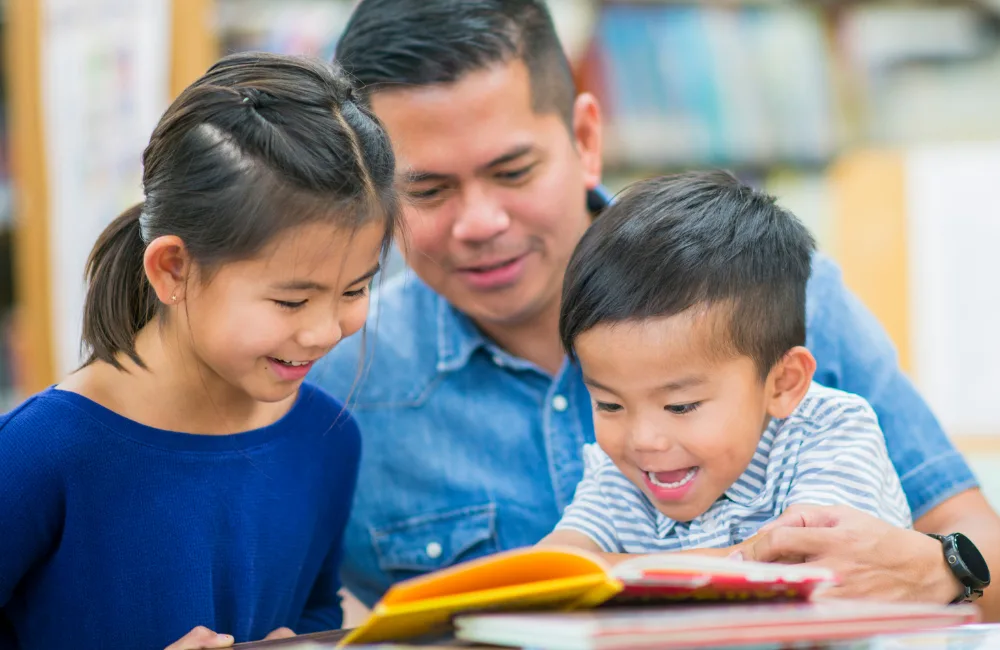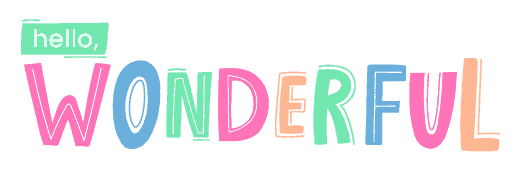
Photo Credit: Canva
By using this site, you agree to our Terms of Use. This post may contain affiliate links. Read our disclosure policy.
Follow us on Instagram for more fun ideas for kids!
As a parent, grandparent, or caregiver, reading to your child from their earliest days may just be one of the best things you can do for your child. This article lays out the key benefits of reading to children, backed by science.
Why is reading to a child so important?
In a 2019 journal publication by the Journal of Developmental & Behavioral Pediatrics, When Children Are Not Read to at Home: The Million Word Gap, parents who read 1 picture book with their child every day provide their child with an introduction to an estimated 78,000 words per year. With those numbers in mind, it’s then estimated that those children who are read to regularly in the first 5 years of life are exposed to 1.4 million more words than children who are never read to. These numbers alone give us one of the best reasons to read to our children on a daily basis.
What is Parentese?
Infants start to pick up on words and language sooner than we may think. Research shows that babies’ brains develop and prepare to speak months before they even say their first words. It’s also shown that babies prefer what is called parentese. Parentese is speaking a language that gets the baby’s attention, simple grammar and words, exaggerated sounds and the manner in which we often sing songs to babies. Sometimes it seems a little silly, maybe annoying to those adults witnessing the over-exaggeration of words in song form, but it’s very important for their language development. Emphasizing the vowels and creating high-pitched sounds gives the babies clear models of the sounds that make up the individual words…and the best part of all, babies love it.
What are the benefits of reading to children?
Connection and Bonding
Reading to and with your child will help create many moments of connection during the reading process. As you spend time together reading, you’ll create a sense of security for your child and your child will likely learn to view reading and literacy as a positive experience. With each book there are often various opportunities to bring the characters to life, to use different voices, make it fun and interactive for both you and your child. The time you take to read to your child will create a bond like no other.
Cognitive and Language Development
As children grow and develop, there are four main areas of development. These include language and communication, cognitive, motor skills development, and social/emotional.
Cognitive development is defined as how children think and explore. It’s the development of knowledge, problem solving, skills, and dispositions, which in turn helps children to think about and gain understanding of the world surrounding them. Brain development is a part of cognitive development. Language development pertains to the development of skills used to communicate with others through languages, which is absolutely developed during reading.
Listening Skills
Regular reading over time gets the kids to listen and eventually comprehend what’s being read to them. While they’re developing listening skills, they’re also likely to develop longer attention spans, are more likely to sit still and increase their memory retention.
Creativity
Reading allows children to practice using their imagination, sometimes vivid, by allowing the words to describe a certain image at the same time the reader manipulates the picture in their own mind. Reading encourages creativity, which in turn brings about new ideas.
Health Benefits
According to an article by Stephanie Nicola, WebMD, there are a number of health benefits associated with reading. These include, but certainly aren’t limited to, reducing stress, improving brain connectivity and development, lowering blood pressure and heart rate, allowing children to empathize with other people, and aiding in a restful night’s sleep. Not only does readingt improve literacy, brain development and language skills, it also allows you and your child to create a stronger connection with each other.
Social and Emotional Development
Reading and hearing stories aloud about emotions, interactions between family and friends, and ways in which the characters work through different situations is a positive and great way for children to learn both behavioral and social-emotional skills. Reading increases the development of empathy and promotes their emotional well-being in so many ways. It’s suggested that reading fictional stories, especially those that take the readers inside people’s lives and minds, may enhance social skills by using a part of the brain involved in empathy and imagination. With conversation during the process of reading, children may learn to cope with different real-life situations.
Overall Improved Literacy
Consistent reading will help a child learn to listen and sit still for longer periods of time, ultimately improving their concentration abilities. Their level of vocabulary will be expanded and will trickle into more extensive, mature conversation with others. Reading also develops important skills such as recognizing letters and elements of a story, eventually understanding that the printed type of words within the books represent the spoken word. Literacy development refers to the ability to read and write, with reading being at the forefront.
Quality and Quantity of Words
Both quality of language and quantity of words matter. The quantity of words that children hear is very important for language development. Quality of language refers to word diversity and also to the quality of the speech signal. Books sometimes use words that adults wouldn’t choose or maybe not even know, for example names of plants or animals.
How do I find the appropriate age-level book for my child?
There are so many resources online including specific book lists with the title and shopping links included. Another great online resource is, Tips for Parents: Choosing Books for Infants and Toddlers.
Also check out our recommended 100 must-read books for beginning readers.
Keep in mind when looking for age-appropriate books, the reading level is often listed on the front or back cover. Maybe take a minute to scan the difficulty of the words in the book yourself and see if they would match the age of your child in terms of simplicity and story comprehension. You could also use an app to help determine their reading level, for example, Literacy Leveler. Feel free to ask for recommendations from librarians, educators, and other parents as they may be the greatest resource.
Where can I find books for my child?
Now that you know the age-appropriate book for your child, you’re maybe wondering where you can find books. I highly recommend your local library to start, as it’s free. There are also these libraries that have been popping up in neighborhoods across the county called a Little Free Library
Secondhand stores often have children’s books and are very affordable, sometimes $0.50 – $1.00 depending on the store. Another great resource would be to participate in a book exchange with friends, family or neighbors that have similar aged children.
My own experience as a book-loving Mom
I was fortunate enough to be able to stay home with my boys when they were little, and the one thing we did consistently throughout each day was read books. Our bedtime routine was always, always, always bath time, a small snack while reading 20-30 minutes each night, teeth brushing, then lights out. We were always very routine and intentional with bedtime from the beginning. With that routine, there was rarely any sort of battle to get ready for bed, as we all looked forward to reading together. All that being said, I am a firm believer in our bedtime routine including so much reading time that my boys both started reading words at age 4. My oldest had delayed speech and didn’t even speak his first words until age 3, but believe me he was obviously retaining all of the words on the pages every day leading up to being able to read independently a year later. It’s never too late to start reading to your child. Whether your child is a baby, toddler, preschool-age or school age, start reading to and with them today.
More Parenting Articles
How To Make Kids Listen Openly
Teach Your Kids To Choose Good Friends
I Don’t Force My Kids To Hug Others And This Is Why

Jodi is a fun-loving mom of two boys, ages 16 and 11, who live in Minneapolis, Minnesota. As a stay-at-home mom over the years she has taken on the role of renovating just about every space in their home. She enjoys photography, being a brand partner for Young Living essential oils, sports, reading, crafts, exercise, cooking, plants and gardening. Her love language is acts of service and she’s an Enneagram type two, wing three. Follow her on Instagram @jodileigham
Agnes Hsu is a mom of three and has been inspiring parents and kids to get creative with easy activities and family friendly recipes for over 10 years. She shares her love for creative play and kids food to her 2MM+ followers online. Agnes' commitment to playful learning and kindness has not only raised funds for charity but also earned features in prestigious nationwide publications.

